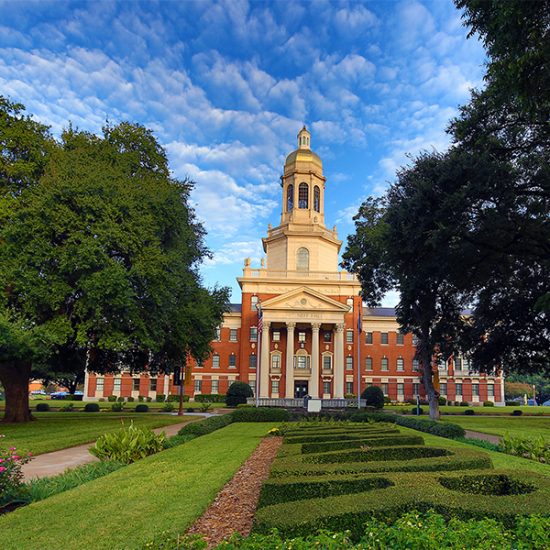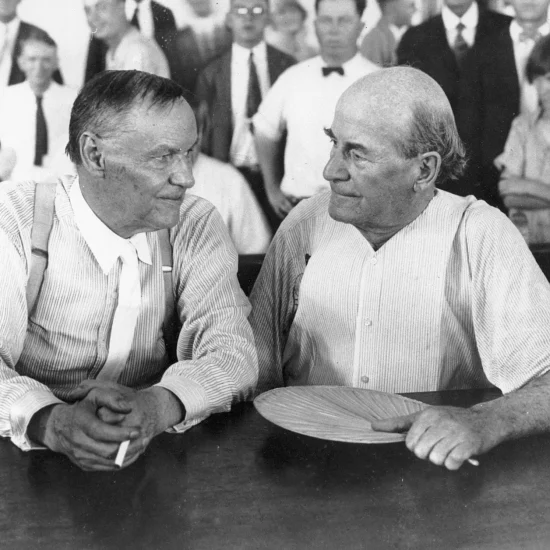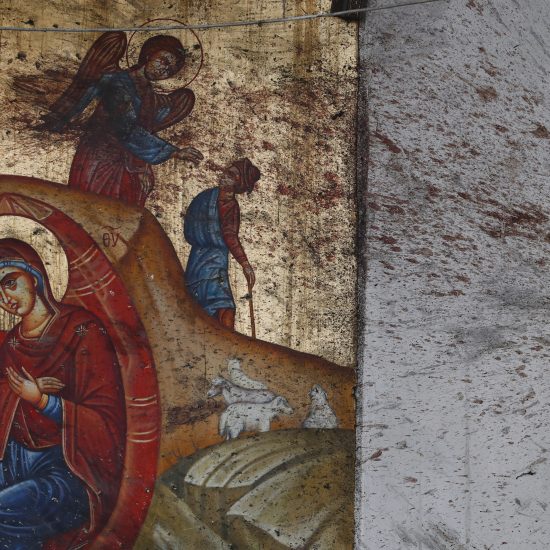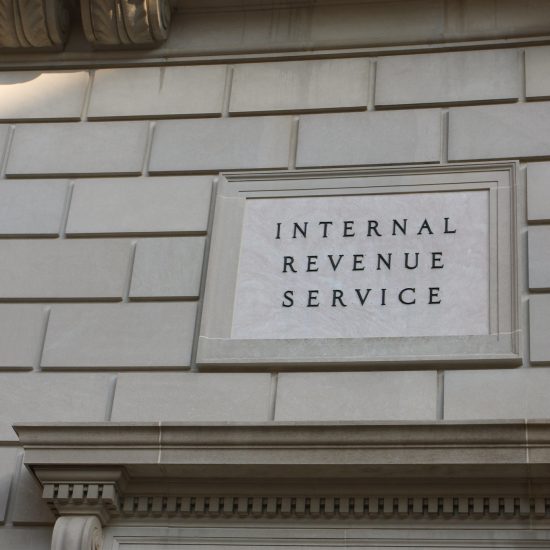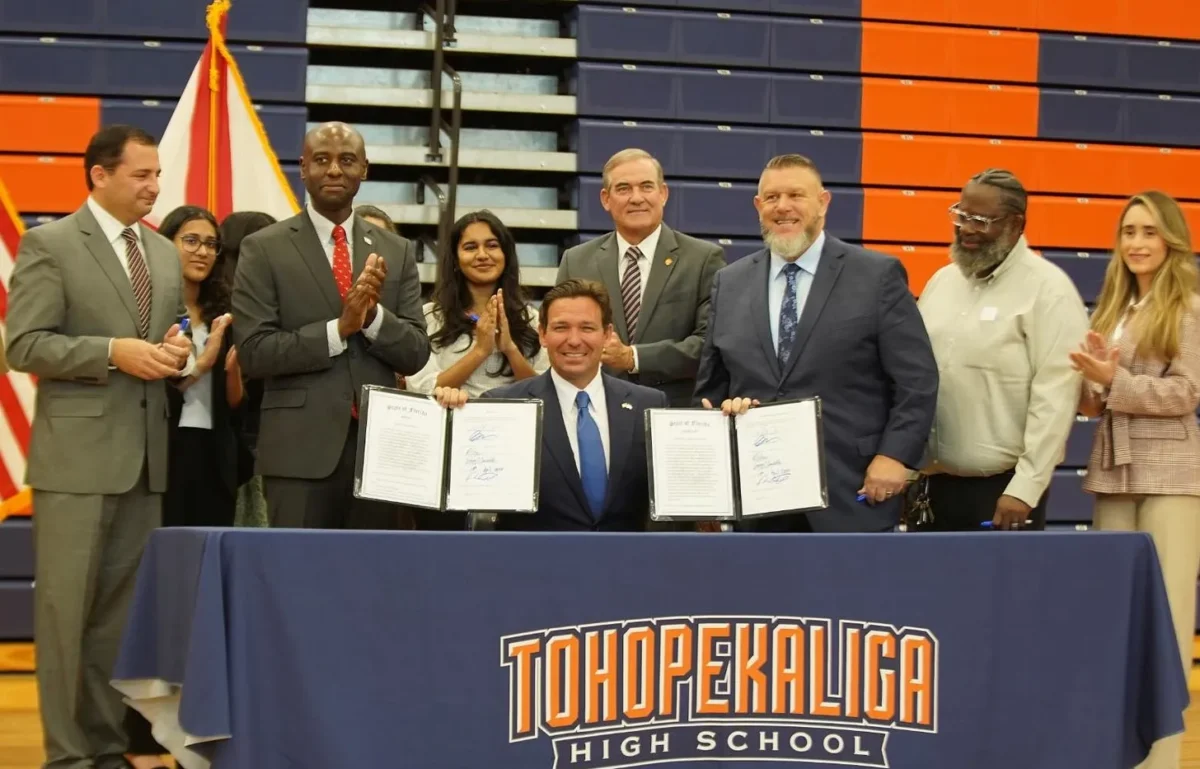
Last week, Florida Gov. Ron DeSantis signed a bill to allow the state’s public schools to bring in volunteer, unlicensed religious chaplains to counsel students. As he became only the second governor to approve such a school chaplaincy program, he insisted it was wrong to not allow religious groups to counsel students in public schools.
“No one’s being forced to do anything, but to exclude religious groups from campus, that is discrimination,” DeSantis said. “You’re basically saying that God has no place. That’s wrong. That’s not what our Founding Fathers intended.”
With that argument against excluding religious groups, DeSantis might have problems with comments made last week by a key politician who sounded off on the proposal: … checks notes … Florida Gov. Ron DeSantis.
“Now, some have said that if you do a school chaplain program, that somehow you’re going to have Satanists running around in our schools,” DeSantis said. “We’re not playing those games in Florida. That is not a religion, that is not qualified to be able to participate in this. So we’re going to be using common sense when it comes to this.”
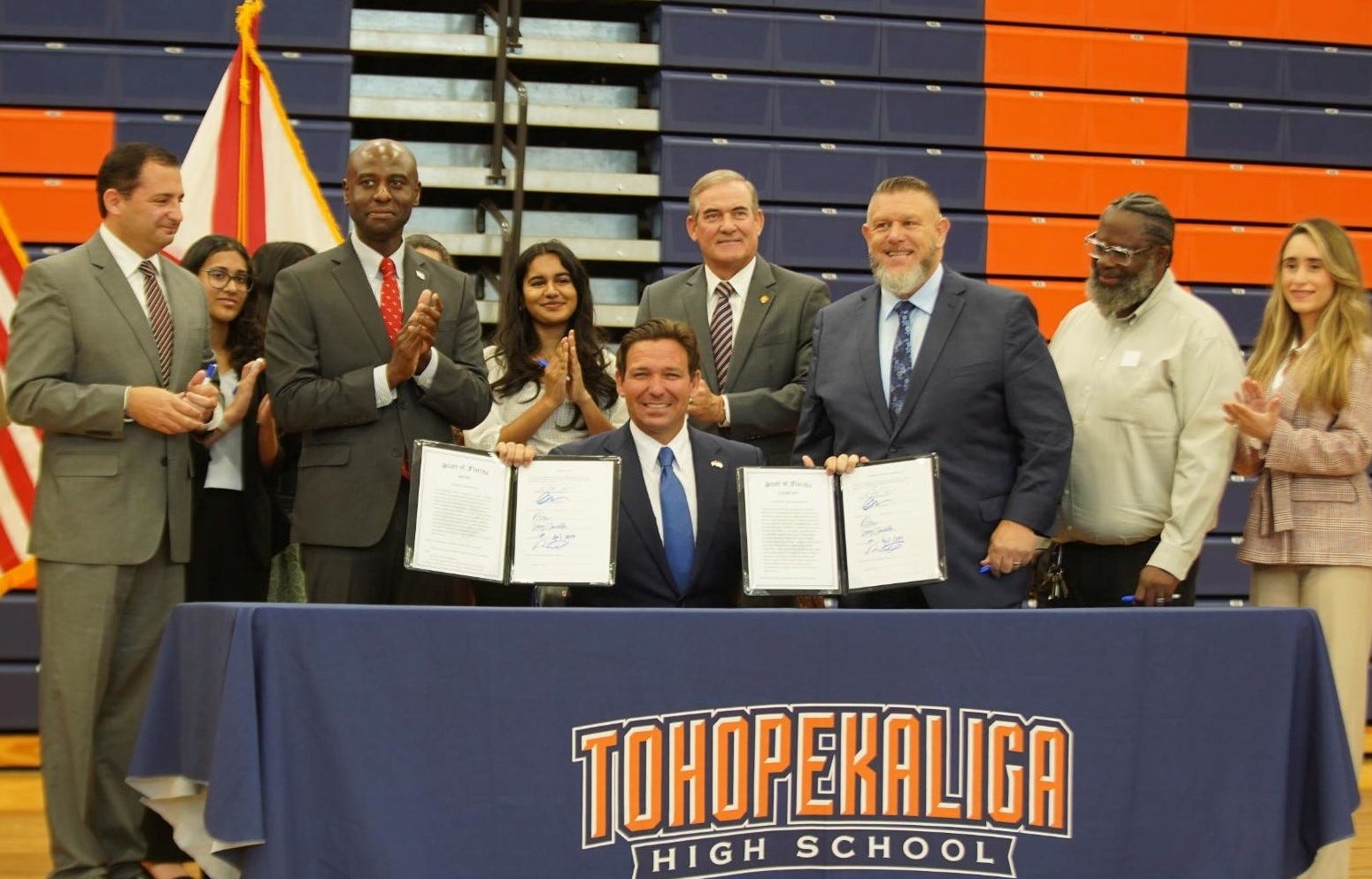
Florida Gov. Ron DeSantis holds up the new public schools “chaplain” law and another new law he signed at Tohopekaliga High School in Kissimmee, Florida, on April 18, 2024. (Public Domain)
With his contradictory remarks that violate the First Amendment’s prohibition against religious establishment, DeSantis took an already controversial idea and injected it with steroids. But DeSantis is not alone in pushing for religious discrimination in public schools. Rocky Malloy leads the National School Chaplain Association, a Christian group pushing bills like the one DeSantis signed. He appeared last week on the radio show of a Christian Nationalist group led by pseudo-historian David Barton to encourage such legislation and dismiss concerns about Satanists being allowed to participate.
“There’s no such thing as a Satanic chaplain. I know they threaten that, but there are none,” Malloy claimed. “It’s a typical demonic threat. They have no resources, they have no chaplains, no chaplains recognized because they don’t qualify. … If you blaspheme God, you do not qualify to be a religion. So no Satanist can get a job saying equal access, because they’re not in that group.”
Malloy tried to point to the fact that Satanists don’t qualify as chaplains in federal government positions even though there are actually qualifications for such positions. Florida’s new law, on the other hand, merely requires someone to pass a background check (which would allow many Satanists and disqualify some pastors). The Satanic Temple is recognized by the IRS as a tax-exempt church.
Florida isn’t the only state trying to have its Easter cake and eat it too. Lawmakers in 13 other states filed similar bills this year. Bills passed one chamber in both Indiana and Utah before dying for this year, while a bill in Oklahoma passed in the state House yesterday (April 24). Another such bill has passed the Senate in Louisiana and just had a committee hearing in the House yesterday.
This new legislative movement for “chaplains” in public schools started last year in Texas. After lawmakers passed a bill that required every school district to vote on whether or not to replace certified counselors with unlicensed “chaplains,” advocates like the Baptist Joint Committee for Religious Liberty, Interfaith Alliance, and Texas Impact mobilized chaplains and other religious leaders to campaign against local approvals. All 25 of the largest school districts voted against the “chaplaincy” program.
Despite the local organizing success to minimize the impact of the Texas bill, the proposal still inspired copycat bills this year (with even more states likely to consider it next year). As lawmakers debate such legislation, the concern about Satanists being allowed as chaplains popped up in multiple states, thus leading the activist and the governor to try and declare by fiat that such individuals wouldn’t qualify.
With the growing legislative effort to bring religious counselors into public schools and the attempt to declare some ineligible to participate because of their faith, this issue of A Public Witness looks at the problems with the chaplaincy bills by considering what a chaplain really is and what religious freedom actually looks like.
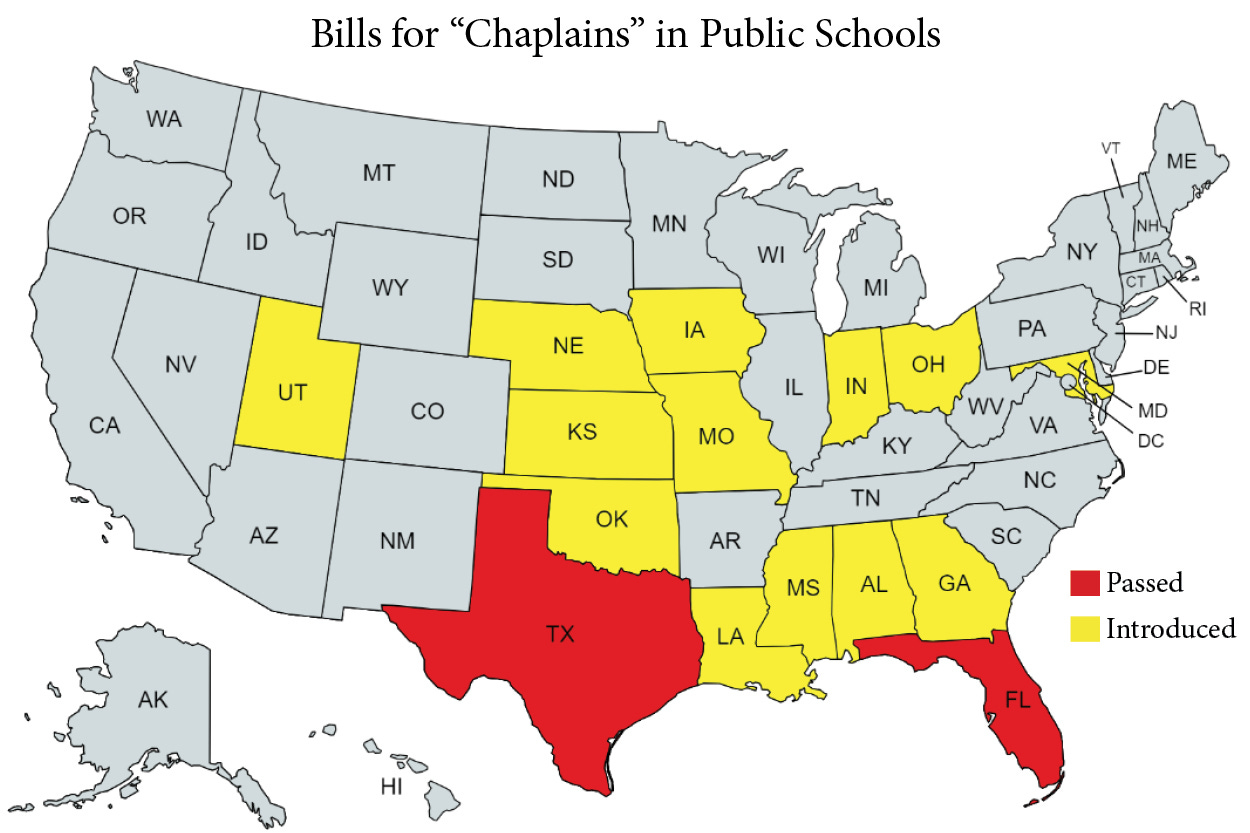
Spiritual Care Professionals
Like many careers, the role of chaplain has professionalized since its inception long ago. Once thought of in exclusively Christian contexts, in the modern era chaplains have become emblematic of America’s religious pluralism.
This is due in part to the once-famous story of the “Four Chaplains”: a Jew, a Catholic, and two Protestants who in 1943 together gave their lives to rescue others aboard their sinking military ship. While there are chaplains present in a variety of institutions, from the military to prisons to legislatures, the most common chaplains that everyday Americans encounter are in hospitals.
“Chaplaincy as a profession is interfaith,” Kristel Clayville, ethics professor and former chaplain, told us. “A chaplain has to be able to see patients from every faith background, religion, and worldview. Most importantly, the job is to help patients use their own beliefs and values to aid in their healing and decision-making.”
Chaplains exist to provide spiritual care to every conceivable type of person in moments of crisis. So how does a chaplain accomplish this incredibly difficult task? Training. Lots and lots of training.
Ryan Fordice, chaplain at Unity Hospice and Palliative Care in Chicago, Illinois, told us, “I simply could not do this effectively without the years of rigorous education and training I received, which itself developed over decades of refinement as a discipline, any more than I could go win a case at court without going to law school. Just showing up as a religious and ostensibly well-intended person is usually not going to be enough, and is certainly not chaplaincy.”
This training includes things like a graduate degree in ministry or theology, a practical component consisting of a Clinical Pastoral Education residency, official endorsement by a religious or spiritual body, and thousands of hours of work experience in the field. And all of this is just a prerequisite to sit for board certification through the Association of Professional Chaplains, in which a chaplain must demonstrate 29 defined competencies of spiritual care and mastery of a Common Code of Ethics that outlines norms and expectations.

A chaplain prays for a COVID-19 patient while on a video call with the patient’s daughter at Providence Holy Cross Medical Center in Los Angeles, California, on Nov. 19, 2020. (Jae C. Hong/Associated Press)
The rigorous standards for professional chaplains help explain the growth of the position in many areas of society. The well-earned societal and institutional trust means you know what you are getting when you talk to a chaplain.
“Chaplaincy as a profession has spent decades developing these structures of training, ethics, and certification specifically to differentiate professional spiritual care from other forms of religious leadership,” Fordice explained. “It’s someone who is trained to support your spiritual needs, to do so without making it about themselves or their own faith, and to do so while being a safe person to be with. A framework that allows anyone who wishes to say ‘I’m a chaplain’ misrepresents and undermines this completely.”
Clayville echoed this sentiment: “All of this training is to ensure that a hospital chaplain prioritizes the values and beliefs of the patients they see. It is very easy to center your own beliefs in patient visits, and it takes extensive training and practice not to. You cannot become a chaplain just by calling yourself one.”
Both experts also expressed deep concerns with how the safety and rights of high school students appear to be an afterthought in the various bills introducing public school “chaplains.” To invite untrained adults to claim religious authority over children opens the door to a variety of forms of abuse.
Get cutting-edge analysis and commentary like this in your inbox every week by subscribing today!
Students’ Religious Freedom
The difference between professional chaplains and the “chaplains” allowed in Florida and Texas public schools adds to the church-state problems with the legislation. A local pastor without chaplaincy training might not be equipped to serve in nonsectarian ways — nor do the laws require school “chaplains” to act in such a manner.
“There is no requirement in this law that the chaplains refrain from proselytizing while at schools or that they serve students from different religious backgrounds,” a letter signed by more than 170 Texas chaplains explained to the local school board to urge against utilizing the “chaplaincy” program. “Not only are chaplains serving in public schools likely to bring about conflict with the religious beliefs of parents, but chaplains serving in public schools would also amount to spiritual malpractice by the chaplains. Government-sanctioned chaplains make sense in some settings, but not in our public schools.”
“We urge you to support religious freedom and parental rights by rejecting this harmful program to have government-approved chaplains in our public schools,” the interfaith group of chaplains added in their letter. “We believe that families, not the government, are entrusted with their children’s spiritual development.”
As the legislative push broadened this year beyond Texas, more chaplains signed onto a similar letter. And a coalition of 38 faith groups endorsed a statement urging lawmakers to reject such legislation, specifically explaining the church-state problems that will arise in public school settings.
“Installing chaplains in our public schools would violate students’ and families’ religious freedom. The First Amendment to the United States Constitution guarantees us all the right to choose for ourselves which faith, if any, to follow — without pressure or influence from government officials,” the faith groups explained. “Religious freedom means that all students should feel welcome in our public schools, and no student should have to sacrifice their religious freedom to access counseling or other support services.”
The faith groups added, “Having a school chaplain of any faith would amount to government-sponsored religion and create an environment ripe for religious coercion and the indoctrination of students.” That is, of course, what the politicians pushing the “chaplains” legislation actually want. Gov. Ron DeSantis made that clear. He argued that schools should have such “chaplains” to bring God into the public schools and that those with different beliefs don’t count as a religion. That’s not religious freedom; that’s an attempt to establish a government-sponsored religion.

Screengrab as Texas state Rep. James Talarico, a Democrat and former public school teacher, speaks at a Feb. 29, 2024, press conference at the Texas Capitol in Austin with chaplains and religious leaders about the problems with the push to replace school counselors with “chaplains.”
The legislative debates over the bills in various states add to the evidence that the goal isn’t counseling and care for students but to bring Christianity into public schools. With government prayers ruled unconstitutional, this is an attempt to sneak sectarianism in through the back door. Consider the Texas law passed last year. Before voting to approve it, the Republican majority rejected amendments that would have barred proselytizing, mandated chaplains serve all students regardless of their faith, and required parental consent to talk to a chaplain. Without those provisions, this isn’t a chaplaincy program; it’s an evangelistic crusade.
“We are God’s representatives on school campuses,” declares the site of the National School Chaplain Association, the conservative Christian group pushing the state legislation. “God is moving in public education.”
“Use your God-given gifts for a nation-changing mission,” the site adds. “For God & country. Making an impact.”
In case the Christian Nationalistic aims aren’t obvious enough, the group also says the quiet part out loud: their “chaplains” legislation is an effort to bring government prayer back into public schools.
“Good News, prayer is back in school. School chaplaincy is the first opportunity in 60 years to recover religious liberty lost when prayer was kicked out of school in 1962,” wrote Rocky Malloy, the group’s leader who joined DeSantis in claiming Satanists can’t count as chaplains. “To make prayer in school a reality, please give your best gift to the National School Chaplain Association.”
Such a mission is bad for schools, bad for students, and bad for faith. Beware of evangelists in chaplains’ clothing.
As a public witness,
Brian Kaylor & Jeremy Fuzy

